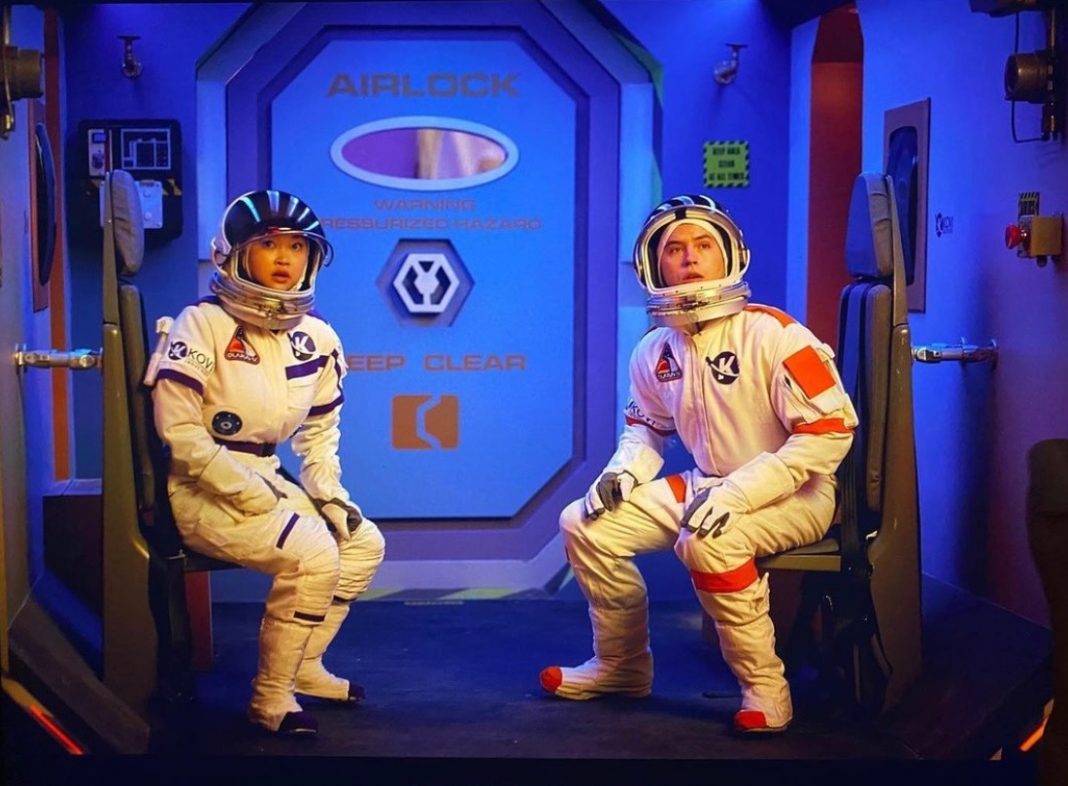“Moonshot” is a lighthearted, sometimes over-the-top, romantic comedy that manages to tie in hard to swallow themes seamlessly. The film emphasizes the importance of balancing sacrifices for loved ones with the prioritization of personal happiness.
Directed by Christopher Winterbauer, the film was released on HBO Max on March 31.
Driving its plot is the understanding that the “unknown” often feels exciting, simply because it is new and full of possibility. Max Taxe, the film’s writer, criticizes the “grass is greener on the other side” mentality, and he promotes loving not the idea of a person or place, but the reality of that person or place.
“Moonshot” follows Walt (Cole Sprouse) and Sophie (Lana Condor) as they travel to Mars. Viewers are also introduced to the character Leon Kovi, the billionaire behind the Mars program, within the first couple scenes. Many will recognize parallels between Leon Kovi and Elon Musk, the CEO of Tesla and SpaceX. Leon is, afterall, a rhyming anagram of Elon.
“Moonshot” is riddled with well-written comedic jabs at Musk, including criticism from Walt’s friend at the beginning when he tells Walt he needs to stop with the “Leon Kovi hero worship,” a frequent request directed at Elon Musk fans.
Without regard to Musk jokes, some of the film’s comedy was overdone and cringey, but most of it was well-written and perfectly timed by Winterbauer and the actors. Sophie’s nervous dancing is funny when first introduced, but far-fetched when she’s boarding the spaceship.
“Moonshot” also has some over-the-top, meant-to-be-romantic lines one can only assume were as painful to act out as they were to hear as a member of the audience, so cut the actors a break in these moments.
Sprouse and Condor deliver a strong performance where the scriptwriting allows, and both actors take on the air of their characters well.
The film is sprinkled with side comments about how Earth has nearly been destroyed by garbage and climate change. One character, Tabby, says, “I’m hoping he’ll save the day by coming up here and teaching us a bit about how Mars will someday be as green as Earth. Hopefully greener, as Earth is dying.”
Though the concern is relevant and necessary, some of the lines felt forced and dramatic at first.
That said, it seems the characters who are happy to stay on Mars accept the idea of a dead Earth and want only to start life on a new planet. Sophie’s character wants nothing more than to save Earth. In that way, these dramatic lines from characters who seem to have given up on Earth help to showcase Sophie’s honorable goals.
Sophie’s DIY dress is fitting for a Mars trip with a classic space-girl vibe. Think Jetsons but metallic. The passengers’ suits also fit the typical space travel aesthetic but utilize teal with orange stripes to make them more interesting. Purple suits with orange stripes make an appearance as well with a couple of orange suits here and there.
Scenes wherein a female character has to change and a male character is either asked or expected not to look but sneaks a look anyway are somewhat of a staple in romantic comedies. Such scenes promote a lack of respect for women and a disregard for bodily autonomy and consent.
The director seems to think having both characters (Sophie and Walt) change and take turns sneakily looking at one another makes this okay. Flipping the script so that a woman is creeping on a man or writing it so that they creep on each other doesn’t make disregarding consent okay. It only normalizes a lack of consent among the sexes.
The film touches on classism but doesn’t address how everyone talks down to Walt and insults his intelligence, revealing a misunderstanding on part of the film crew of how classism often manifests itself. It also neglects to clarify why Walt doesn’t have friends.
“Moonshot” utilizes camera angles that keep the film interesting, and out-of-focus characters allow viewers to experience the lack of control they feel in those moments. While Walt waits for Sophie to decide if she’ll help him in the spaceport, he stands anxiously behind her, and she’s the only thing in focus though he’s the one talking.
Lighting subtly adds to the atmosphere, dimming the scene when characters feel unsure and lighting only the main subject’s face when they feel alone. Shifting lights and different colors also bring the audience into moments reminiscent of classic science fiction.
“Moonshot” is worth watching for its messaging, comedy, and artful use of light and atmosphere. Overall, the entire cast and crew easily make up for exaggerated and out-of-touch moments.
Featured image courtesy of Instagram @colesprouse






